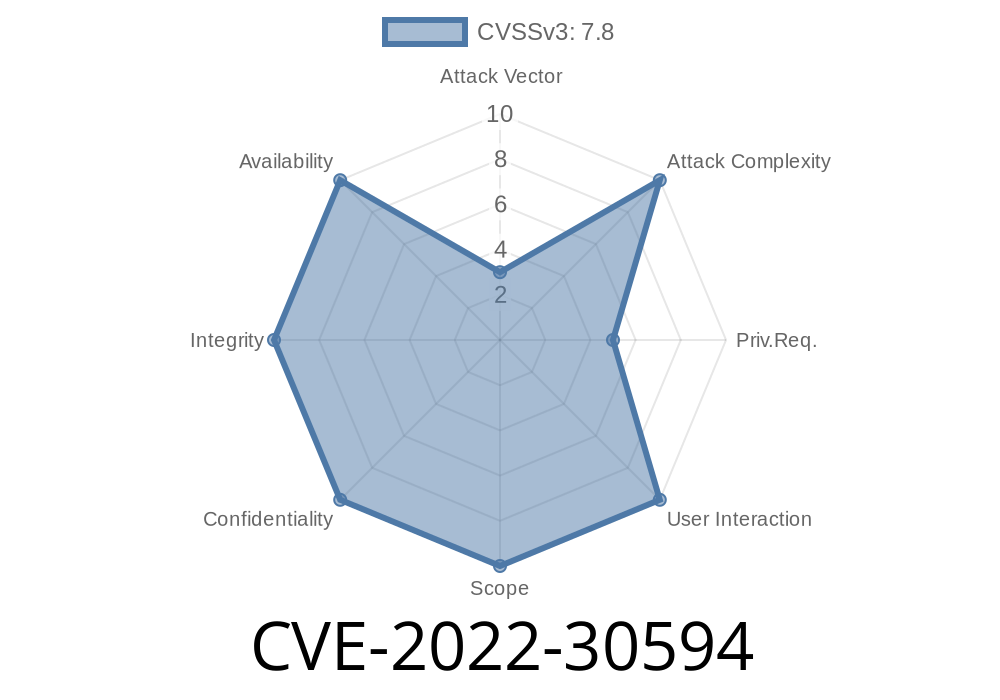One of the most important pieces of the world’s internet infrastructure is the Linux kernel. It’s the beating heart of almost every cloud server and powers a huge fraction of smartphones, laptops, and personal computers. So, when a vulnerability is discovered in Linux, it’s worth sitting up and learning about it — especially if it affects the secure computing filter, seccomp.
In this post, we’ll break down CVE-2022-30594, a vulnerability fixed in Linux Kernel 5.17.2, which allowed attackers to sidestep seccomp’s restrictions using a subtle bug in the PTRACE_SEIZE code path. We’ll boil down the technicals, show the risky code, and explain how it leads to privilege breaks.
What is seccomp, and why does it matter?
Seccomp (secure computing mode) is a Linux feature that lets a program severely restrict the system calls it (or its children) can make. It’s often used in container platforms like Docker, sandboxed apps, and security-critical environments.
When seccomp is enabled, if a process tries to make a forbidden syscall, the kernel blocks or kills it. This is a shield against code execution bugs or exploits breaking out of their sandbox.
What’s PTRACE_SEIZE, and PT_SUSPEND_SECCOMP?
- ptrace is an interface in Linux for one process to observe and control another. It’s commonly used by debuggers like GDB.
PTRACE_SEIZE attaches a debugger to a process in a special, less intrusive way.
- PT_SUSPEND_SECCOMP is a flag that, when used, can temporarily "suspend" seccomp filters for a process. That’s only supposed to be allowed with the right permissions.
CVE-2022-30594: The Bug, in Human Language
In Linux Kernel versions before 5.17.2, there was a logic bug in how the PTRACE_SEIZE code path handled the PT_SUSPEND_SECCOMP flag. Attackers could attach to a target process with this flag, even if they should not have been allowed to. This meant malicious code could bypass seccomp restrictions: doing blocked syscalls, leaking secrets, and breaking out of intended sandboxes.
The Risk
If an attacker had the right privileges or could trick an admin/service into running untrusted code, they could escape a restricted seccomp sandbox. This defeats a primary containment layer for malware and attackers.
Let’s See the Code
Let’s look at the problematic code — and how it allowed the bypass. Here’s an excerpt from the (pre-5.17.2) Linux source, simplified for clarity:
// kernel/ptrace.c, approximate original logic
long ptrace_seize(struct task_struct *child, long flags, long data)
{
// ... snip ...
if (flags & PT_SUSPEND_SECCOMP) {
// This should only be settable under certain safe conditions!
child->ptrace |= PT_SUSPEND_SECCOMP;
}
// ... rest of setup ...
// Vulnerability: Insufficient checks on the PTRACE_SEIZE + PT_SUSPEND_SECCOMP combination
}
What went wrong? The logic *should* have checked if the user/tracer had the proper permissions before letting them pass PT_SUSPEND_SECCOMP. But it failed to enforce this, so a local user could abuse ptrace to suspend seccomp in a target process!
In the patched version (5.17.2), the kernel is stricter
if (flags & PT_SUSPEND_SECCOMP) {
if (!capable(CAP_SYS_ADMIN) || current_uid() != child_uid) {
// Only root or permitted users should be able to do this!
return -EPERM;
}
child->ptrace |= PT_SUSPEND_SECCOMP;
}
The kernel failed to check their permissions, so it drops seccomp for the target.
4. Now, the attacker’s code inside the target can make otherwise prohibited syscalls — escaping the sandbox.
Here’s a simplified snippet in C showing the logic
#include <sys/ptrace.h>
#include <stdio.h>
#include <stdlib.h>
#include <unistd.h>
int main(int argc, char **argv) {
pid_t victim_pid = atoi(argv[1]);
// Try to seize victim and suspend seccomp
long result = ptrace(PTRACE_SEIZE, victim_pid, , PT_SUSPEND_SECCOMP);
if (result == ) {
printf("Success: seccomp for victim is suspended!\n");
// Now you could inject syscalls, etc.
} else {
perror("ptrace seizing failed");
}
return ;
}
*This demonstrates how trivial the attack could be.*
Cloud servers, containers, and sandboxed workloads are the main at-risk targets.
If you run untrusted workloads on Linux, you MUST update your kernel.
Distributions have already patched this in their package managers.
References & Further Reading
- Official Patch Commit (kernel.org)
- CVE Details - CVE-2022-30594
- LKML Patch Discussion
Wrap-up
CVE-2022-30594 is a perfect example of how complex security mechanisms (like seccomp) can be undone by small mistakes in permission checking. Thankfully, the bug was fixed quickly once discovered, but it’s vital to stay ahead by patching your Linux systems and keeping an eye on kernel vulnerabilities — especially if you rely on sandboxing to contain untrusted code.
Timeline
Published on: 05/12/2022 05:15:00 UTC
Last modified on: 07/07/2022 15:15:00 UTC
